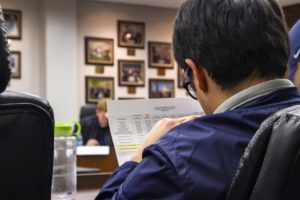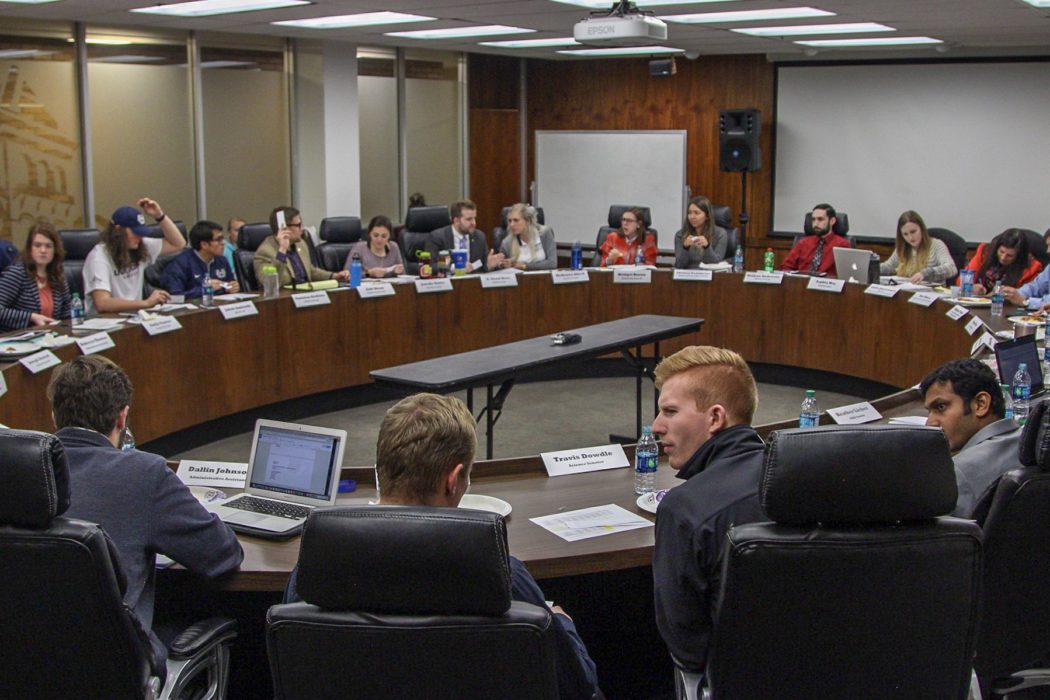After debate, fee board approves $1.94 fee increase for athletics
The Fee
A proposed $8* athletics fee increase was lowered to a $1.94 increase at the Utah State University Fee Board’s final meeting Wednesday. After much discussion, the lowered fee was approved by the board.
The Background
The compromise came after hours of debate on two different proposals made by the university’s athletics department. An original proposal presented by athletics director John Hartwell said the $297,000 generated by an $8 increase would be used to purchase technology to promote attendance and allow e-ticketing for games and other university-sponsored events.
Hartwell’s proposal allocated $72,000 of the $297,000 to be used for “athletics operations uses,” a general fund he said would cover rising costs of things like travel and scholarships.
The proposal was met with skepticism from some board members, who said it was too similar to a proposal the board rejected the previous year. At the recommendation of the executive committee, which is comprised of faculty and staff, athletics came back Jan. 25 with an amended presentation.
Though it’s not necessarily common for organizations to present twice, USU’s vice president for student services James Morales, who serves as an administration representative on the fee board, said “it does happen occasionally.” The music department was given the opportunity to present an amended proposal when it asked for a fee increase in 2016, Morales said in an email.
The amended presentation, given by athletics deputy director and vice president of external affairs Coleman Barnes, allocated the entirety of the $297,000 ask to general uses. Barnes said the money would help athletics keep up with inflationary costs of scholarships, travel, game guarantees and expenses, recruiting, equipment, marketing and medical expenses.
The Debate
This was a problem for some board members, who said it didn’t make sense that a $72,000 need in the original proposal would become a $297,000 need in the second.
Since the $72,000 budgeted for general expenses in Hartwell’s proposal amounted to a $1.94 fee increase, the board should approve nothing more than that amount, argued College of Humanities and Social Sciences Senator Grant Bess.
“They only asked for $1.94 to be put toward general expenses,” Bess said, “everything else was to improve the student experience and that’s what we rejected.”

College of Humanities and Social Sciences Senator Grant Bess discusses the proposed fee at the fee board meeting.
Bridget Brown, the USU Student Association’s student advocate vice president, said she had initially been in favor of the increase, but Barnes’ presentation and conversations with students had led her to agree with Bess.
Specifically, Brown said she was concerned that, when asked what athletics would do if the fee board voted not to increase the fee, Barnes said that “at the end of the day, we’ll move on.”
“I don’t think this fee increase is an absolute need and that is not the impression I got from either presentation,” Brown said. “Perhaps $2 or $3 could go a long way, but I don’t agree with an $8 increase.”
College of Agriculture and Applied Sciences Senator Heather Lieber said the board should “be careful of thinking about $8 as some devastating financial hardship.”
“I totally understand that compounded, it’s a big amount but we also need to be careful on the other side, of thinking it’s some giant burden to students,” Lieber said. “To me, it doesn’t feel too dramatic, I guess.”
Lieber then motioned the board vote to pass the $8 increase, which the board rejected.
College of Science Senator Travis Dowdle argued the fee should not be increased at all.
“I think the students of Utah State are capable of knowing how much $8 feels to them,” Dowdle said. “I think students are opposed to the idea of fees in general because they get hit from so many angles and I think it’s frustrating to just see everything go up.”
Dowdle said he thought the board should keep in mind the reason students choose to attend USU in the first place.
“Utah State is a very attractive institution because of how affordable it is for what you get,” Dowdle said. “I don’t think any student came to Utah State because of our athletic program, but I do think they came because it’s an affordable and great institution.”
College of Engineering Senator Erik Olson also argued in favor of a $0 increase.
“Students don’t want this,” Olson said. “To say anything else is a lie and I think it does a disservice to the majority, the average student who comes to Utah State.”
Both Olson and Dowdle presented data from surveys conducted among students in the colleges of science, engineering, education, arts and natural resources. Results from those surveys showed the majority of the student body was opposed to the athletics fee increase, they said.

Fee board members continue to discuss the proposed athletics fee.
“If we vote in favor of even a dollar I think we are totally ignoring our base,” Olson said. “I think that’s a disservice to them and a disservice to our university.”
Other members expressed concern that the surveys might have been biased or used too-small sample sizes.
“We need to be very careful with how we’re basing decisions for the entire student body off of small data sets and possibly biased data sets,” said USUSA president Michael Scott Peters.
Olson pointed out that the results showed students were in favor of the computer fee increase, so it wasn’t necessarily a matter of students being opposed to fee increases in general.
Peters said board members should give the athletics department more credit for its willingness to amend its proposals and provide more information, including a separate Q&A session board members were able to attend on Monday.
“Athletics has done exactly what we’ve asked for,” Peters said. “They’ve catered to our needs.
Peters also said the board should remember the fee increase was “money coming from students specifically to benefit other students.”
In a motion to vote on a $6 fee increase, Jon M. Huntsman School of Business Senator Cody Davis pointed out that “all these proposed fee increases benefit students.” Even though some, like him, might not utilize Aggie Blue Bikes, the Aggie Shuttle or the Health and Wellness Center, fees for those services still benefited the student body, he argued.
Davis’s motion to vote on a $6 increase passed, but when it came down to a vote, that amount was rejected, with Bess arguing the board needed to “separate whether athletics has merit at this university — which I would argue it does — from them needing this increase.”
In response, Olson argued the fees Davis mentioned were all different because “they help students be students.” Those fees allowed students to attend USU and provided services students might not be able to get on their own, he said.
The Athletics Fee History
Bess pointed out that students had, indirectly, given more money to athletics by virtue of a restructuring of fee distribution implemented in 2016.
That restructuring put fees for the Logan campus’ online students in the same pot as Logan main campus students, Whitney Pugh, the university’s executive director of budget and planning, said in an email. Previously, Logan online student credits (and fees) had been reported in the same category as regional campuses.
A hypothetical budget distribution provided by the athletics department showed this change increased the amount athletics received from student fees from about $4.3 million in 2015 to about $5.1 million in 2016, without a direct increase to the athletics student fee.

A member of the fee board reviews the hypothetical budget distribution.
With this in mind, Brown moved to vote on a $2 increase. Her motion failed, and was followed by a motion for a $0 increase from Dowdle, which also failed. Another motion was made for a $1.94 increase, which also failed.
The Decision
The lack of agreement was met with frustration and puzzlement.
“I don’t really know where we’re wanting to go because I feel like we’re repeating arguments,” Lieber said.
It was odd for the board to focus on whether the increase was a need, Lieber said, because she didn’t think the board would ever deem an athletics increase a need.
With that, Lieber moved again to vote on a $1.94 increase. This motion passed.
In a 15-7-1 decision, the board approved a $1.94 increase to the athletics student fee.
More information about student fees and fee distributions is available on the USU website.
@alyssarbrts
*Fee estimates are based on costs for a student taking 12-18 credits.

